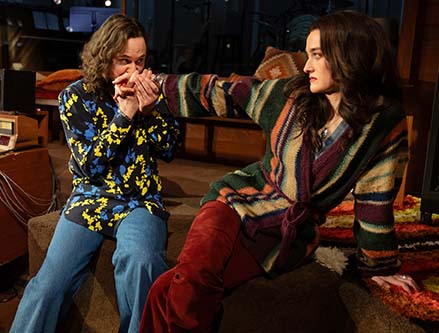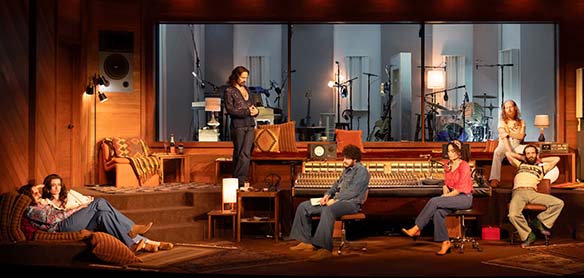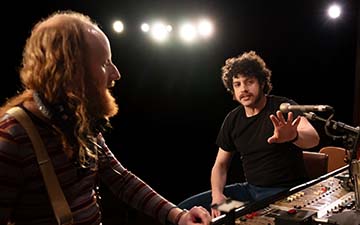By Lucy Komisar
David Adjmi’s new play “Stereophonic” strips away the glitter and glamour of 1970s rock to reveal a gritty, often unsettling portrait of creativity, ambition, and toxic relationships. Set in a California recording studio, this engrossing and entertaining behind-the-scenes drama exposes the misogyny and exploitation lurking beneath the counterculture’s rebellious facade.
The story revolves around Diana (Sarah Pidgeon), a rising folk-rock star whose insecurity clashes with her chart-topping success. Pidgeon delivers a powerhouse performance, capturing both Diana’s raw talent and fragile psyche. Her husband Peter (Tom Pecinka), serving as guitarist and producer, emerges as a controlling, psychologically abusive presence. Pecinka’s nuanced portrayal makes Peter’s cruelty all the more chilling.
Equally compelling is the British duo of Holly (Juliana Canfield) and Reg (Will Brill). Canfield shines as the smart, talented Holly, who finally stands up to her substance-abusing husband. Brill’s Reg embodies the era’s excesses, expecting his wife to clean up his messes both literal and figurative.
Chris Stack rounds out the main cast as Simon, the British drummer oblivious to the damage his absence is causing his family back home. His storyline serves as a stark reminder of the personal costs of pursuing musical dreams.
Adjmi’s script pulls no punches in its depiction of the casual misogyny pervading the music scene. The men, with their requisite long hair and drug habits, cling to patriarchal power structures even as they rail against societal norms. It’s a damning indictment of an era often romanticized in popular culture.
The claustrophobic recording studio setting, brilliantly realized by the design team, becomes a pressure cooker for the characters’ escalating conflicts. As days stretch into months and then a year, moving from Sausalito to Los Angeles, we witness the unraveling of relationships and psyches alike.
A standout element is the character of Grover (Eli Gelb), the neurotic and inexperienced sound engineer. Gelb provides moments of awkward comedy that offer brief respites from the intense drama unfolding around him.
Director Daniel Aukin keeps the pacing taut, allowing tensions to simmer and explode in startlingly realistic outbursts. The frequent screaming matches between characters feel raw and uncomfortable, mirroring the disintegration of their personal and professional lives.
“Stereophonic” confronts the often-glossed-over misogyny of the rock world. Behind many records, there may be stories of exploitation, abuse, and shattered dreams. It’s a sobering counterpoint to the nostalgia often associated with the era.
As Grover aptly puts it, “Don’t you think this is like a nightmare?”
“Stereophonic.” Written by David Adjmi, original songs by Will Butler, directed by Daniel Aukin. Golden Theatre, 252 West 45th St., NYC. Runtime 3hrs10min. Songs are here. Opened April 19, 2024, closes Jan 12, 2025. Review on New York Theatre Wire.





